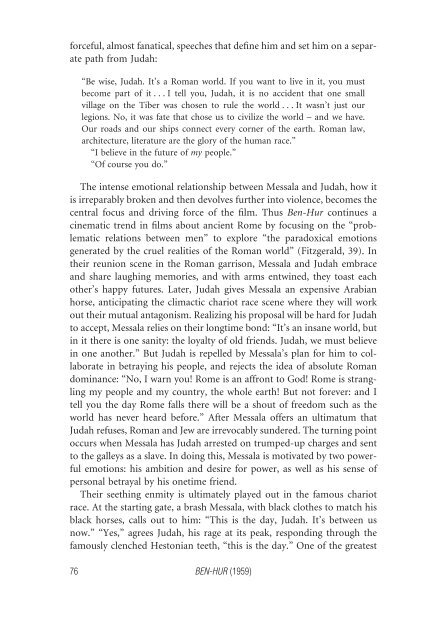Big Screen Rome - Amazon Web Services
Big Screen Rome - Amazon Web Services
Big Screen Rome - Amazon Web Services
Create successful ePaper yourself
Turn your PDF publications into a flip-book with our unique Google optimized e-Paper software.
forceful, almost fanatical, speeches that define him and set him on a separate<br />
path from Judah:<br />
“Be wise, Judah. It’s a Roman world. If you want to live in it, you must<br />
become part of it . . . I tell you, Judah, it is no accident that one small<br />
village on the Tiber was chosen to rule the world . . . It wasn’t just our<br />
legions. No, it was fate that chose us to civilize the world – and we have.<br />
Our roads and our ships connect every corner of the earth. Roman law,<br />
architecture, literature are the glory of the human race.”<br />
“I believe in the future of my people.”<br />
“Of course you do.”<br />
The intense emotional relationship between Messala and Judah, how it<br />
is irreparably broken and then devolves further into violence, becomes the<br />
central focus and driving force of the film. Thus Ben-Hur continues a<br />
cinematic trend in films about ancient <strong>Rome</strong> by focusing on the “problematic<br />
relations between men” to explore “the paradoxical emotions<br />
generated by the cruel realities of the Roman world” (Fitzgerald, 39). In<br />
their reunion scene in the Roman garrison, Messala and Judah embrace<br />
and share laughing memories, and with arms entwined, they toast each<br />
other’s happy futures. Later, Judah gives Messala an expensive Arabian<br />
horse, anticipating the climactic chariot race scene where they will work<br />
out their mutual antagonism. Realizing his proposal will be hard for Judah<br />
to accept, Messala relies on their longtime bond: “It’s an insane world, but<br />
in it there is one sanity: the loyalty of old friends. Judah, we must believe<br />
in one another.” But Judah is repelled by Messala’s plan for him to collaborate<br />
in betraying his people, and rejects the idea of absolute Roman<br />
dominance: “No, I warn you! <strong>Rome</strong> is an affront to God! <strong>Rome</strong> is strangling<br />
my people and my country, the whole earth! But not forever: and I<br />
tell you the day <strong>Rome</strong> falls there will be a shout of freedom such as the<br />
world has never heard before.” After Messala offers an ultimatum that<br />
Judah refuses, Roman and Jew are irrevocably sundered. The turning point<br />
occurs when Messala has Judah arrested on trumped-up charges and sent<br />
to the galleys as a slave. In doing this, Messala is motivated by two powerful<br />
emotions: his ambition and desire for power, as well as his sense of<br />
personal betrayal by his onetime friend.<br />
Their seething enmity is ultimately played out in the famous chariot<br />
race. At the starting gate, a brash Messala, with black clothes to match his<br />
black horses, calls out to him: “This is the day, Judah. It’s between us<br />
now.” “Yes,” agrees Judah, his rage at its peak, responding through the<br />
famously clenched Hestonian teeth, “this is the day.” One of the greatest<br />
76 BEN-HUR (1959)



